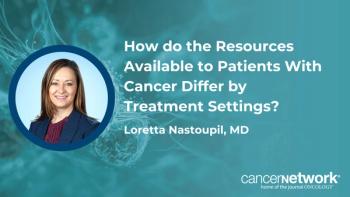
Oncology NEWS International
- Oncology NEWS International Vol 6 No 8
- Volume 6
- Issue 8
With Genetic Tests, Informed Consent Enters Psychosocial Realm
NEW ORLEANS--Informed consent has historically focused on physical risks, but genetic testing will move informed consent into psychosocial areas, Karen Rothenberg, JD, MPA, Marjorie Cook Professor of Law, University of Maryland School of Law, said at the 21st annual meeting of the American Society of Preventive Oncology (ASPO).
NEW ORLEANS--Informed consent has historically focused on physical risks,but genetic testing will move informed consent into psychosocial areas,Karen Rothenberg, JD, MPA, Marjorie Cook Professor of Law, University ofMaryland School of Law, said at the 21st annual meeting of the AmericanSociety of Preventive Oncology (ASPO).
With genetic testing, the informed consent process will need to addresssuch psychosocial risks as changes in self- image, altered family relationships,and possible stigmatization,
Patients must be told the potential benefits of genetic testing butalso the uncertainties, she said. For example, for many genetic tests forcancer, the true predictive value is unknown, the risk for misinterpretationis great, the effectiveness of prevention and intervention has not beensatisfactorily validated in trials, and the impact of testing on changesin health behavior is unknown.
Physicians must inform their patients that the legal protection of testresults is not uniform at this point, said Prof. Rothenberg, who is alsodirector of the Law and Health Care Program at the University of Maryland.
She said that about a dozen states prohibit health insurers from requestingthe results of genetic testing, from making coverage conditional on genetictesting, or from considering genetic testing in setting rates. Another20 states have laws pending.
"The catch is that except for a few states, most laws only protectthe genetic test result, not genetic information, such as might be obtainedfrom the family history in the medical record," she stressed.
In addition, states cannot regulate self-funded insurance plans, whichconstitute about half of all employee-provided insurance, Prof. Rothenbergsaid. The Health Insurance Portability and Accountability Act of 1996,also called the Kassenbaum/Kennedy law, provides some protection. However,it cannot prohibit insurers from requesting disclosure of genetic information,increasing rates for patients with certain conditions or findings, or excludingfrom coverage all patients with certain conditions.
Few actual protections exist in the workplace, either, since again mostrestrictions apply to genetic test results, not genetic information. Employersare generally not prohibited from requesting medical releases, and theycan legally attempt to obtain access to information, she said.
Issues of Family Privacy
The area of family privacy is especially controversial now. Issues includethe right of the patient and other family members to know or not know testresults, the individual's responsibility to share information with familymembers, reproductive decision making, and genetic testing of children.
"In the informed consent process, there needs to be discussionabout family sharing of information," Professor Rothenberg said. "Andpeople need to recognize that having genetic information can change theirresponsibilities, obligations, even rights."
Articles in this issue
over 28 years ago
Two-Step Approach Urged to Avoid High Tech, Wild Deathover 28 years ago
Health Insurance Premiums Tax Proposedover 28 years ago
ODAC Votes Yes on Taxol for Kaposi's Sarcomaover 28 years ago
Five Principles Help Resolve Ethical Dilemmas in Careover 28 years ago
Ovarian Cancer Survivors Form National Coalitionover 28 years ago
Photodynamic Therapy Used in Nonmelanoma Skin Cancerover 28 years ago
Increased Numbers of Nevi Can Predict Risk of Melanomaover 28 years ago
Cryoablation May Have Limited Role in Prostate Cancer Treatmentover 28 years ago
Americans Not Convinced of Value of Watchful Waitingover 28 years ago
Breast and Arm Sensations Are Common After Breast SurgeryNewsletter
Stay up to date on recent advances in the multidisciplinary approach to cancer.



















































